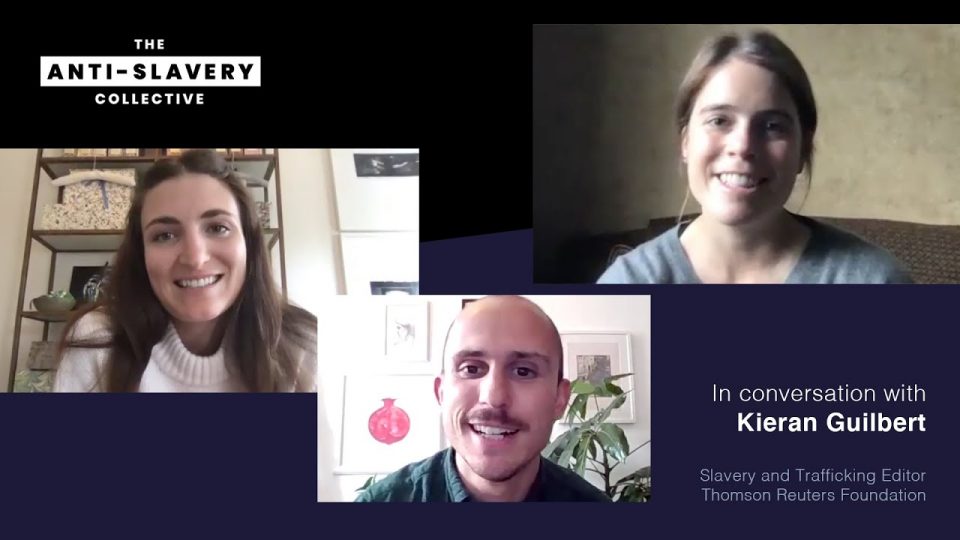While we stay at home and work from home, our co-founders, HRH Princess Eugenie of York and Julia de Boinville, have been talking to people from across the anti-slavery movement to find out how COVID-19 has affected their work.
Our guest today is Kieran Guilbert, the Slavery and Trafficking Editor of the Thomson Reuters Foundation.
We speak to Kieran about how he and his global team of journalists have reacted and adapted to COVID-19. Modern slavery is, in general, a very under-reported issue. At The Anti-Slavery Collective, we are so dependent on and grateful for the reporting of Kieran and his team. They seek to raise awareness and inform society about modern slavery by giving a voice to the voiceless, producing nuanced and holistic reporting, and highlighting stories that can have a real impact. As the pandemic exacerbates exploitation already endured by victims and increases the vulnerability to exploitation of millions, their reporting has been invaluable.
After our discussion with Kieran, we are hopeful. Kieran, his team and many others have shone a spotlight on the grievous inequalities and cracks in our societies that have been exposed by COVID-19; this increased awareness could and should drive change to a more ethical and more sustainable post-pandemic world.
“Everything we do during and after this crisis must be with a strong focus on building more equal, inclusive and sustainable economies and societies that are more resilient in the face of pandemics, climate change, and the many other global challenges we face.”
António Guterres, Secretary-General of the United Nations
Reporting during COVID-19
Kieran and his team have shifted their focus to shining a light on the immediate impacts of the COVID-19 shockwaves on victims, survivors, at-risk communities, and anti-trafficking efforts. They have reported on how travel bans have stalled rescue operations of desperate young women who, having been trafficked from South East Asia into forced marriages in China, had finally escaped; how the emerging economic crisis threatens the fresh start of survivors in Bangladesh, leaving many struggling to get by and at risk of re-trafficking; how school closures could make children easy prey to cybersex traffickers; how virus prevention procedures have put on indefinite hold Brazil’s special mobile enforcement group, which travels nationally to raid places suspected of using slave labor.
We discuss the article that Kieran recently wrote about how COVID-19 could deliver a “double blow” to modern slaves in Britain. Those showing symptoms are unlikely to seek healthcare either because they are afraid to be mistaken for an illegal migrant rather than a trafficking victim or because they are forced to keep working. Those without work during lockdown, such as those who are exploited in car washes, could become further indebted to their traffickers and be forced to take dangerous and illegal jobs.
Perhaps most crucially, the Thomson Reuters Foundation is giving a voice to those whose plight and voices often go unnoticed. They recently began a series Life Under Lockdown, which examines how coronavirus lockdowns are affecting vulnerable people around the world through first person narratives. In the words of an anti-slavery campaigner in Vietnam or a garment worker in India, both struggle and hope can be found.
What can you do?
Educate Yourself. Kieran emphasises the importance of being well informed. Modern slavery is an extremely complex issue that requires a holistic understanding of the multiple drivers, forms and solutions. Thomson Reuters Foundation strives to convey the nuances of the issue in their reporting. If you want to stay up-to-date with their expert journalism, you can sign up to receive their weekly “Human Trafficking” newsletter straight to your inbox.
Read more about what you can do in our recent post, ‘6 ways you can fight modern slavery from home.‘
Thomson Reuters Foundation
The Thomson Reuters Foundation, the philanthropic arm of Thomson Reuters, focuses on advancing media freedom, fostering more inclusive economies, and promoting human rights. Their news service sheds a light on the biggest global challenges affecting human rights, particularly women’s rights, LGBT+ issues, the human impact of climate change, access to land and property rights, and modern slavery. Kieran leads the modern slavery and trafficking team of 9 correspondents based all around the world. Read all of their reporting, here.
Cyber Sex Trafficking
Kieran talks about the growing issue of cybersex trafficking in South East Asia. Cybersex trafficking is the live-streaming sexual abuse of children viewed over the internet.
Read Kieran’s reporting on cybersex child trafficking in the Philippines.
